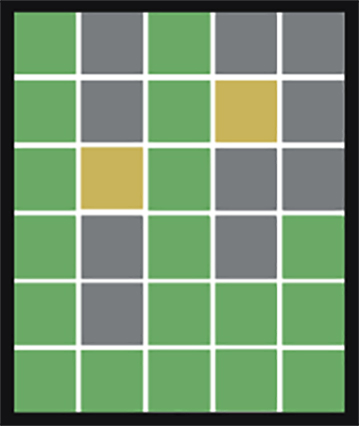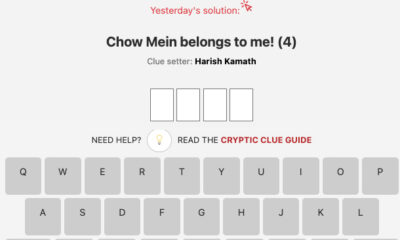
Lifestyle

Why Wordle is the game of the moment
Published
2 years agoon
What’s simple and complicated, addictive and once-off, free, and also owned by the New York Times, and something you can do alone or with others? It’s Wordle, the word game that’s taken the world by storm. As one person famously said (on Twitter recently), “Wordle is the sourdough starter of Omicron.” To which another person responded, “Just imagine your 2019 self trying to make sense of this tweet.”
Indeed, the word game has made itself at home in our strange new world. And while a cynic (14 February’s mind-bending word) might say it’s a passing fad, it looks like it’s here to stay as a firm feature of pandemic life.
At a time when our existence is both frenetic and slow (when you’re hit by lockdown or quarantine), the game demands that you spend a bit of time each day exercising your brain. But not too much – you can do only one puzzle a day. Knowing you have this task to do in one 24-hour cycle feels somewhat like an indulgence – like making a cup of tea or taking a lunch break. And to know you’re competing against millions around the world creates a feeling of connection that many of us are missing two years into COVID-19.
Another surprising outcome of the game is that everyone playing it seems to have made an unspoken, mutual agreement not to ruin it for others. People share their results on social media by posting the number of yellow and green squares they got and how many tries it took them to guess the word. But they don’t share the actual word or words they guessed. In our climate of cancel culture and online shaming, this collective, silent agreement is refreshing and heart-warming.
You can even go onto the Wordle archive and start at the very beginning. Brooklyn software engineer Josh Wardle created the game for his partner, who loves word puzzles. If you bought your significant other a bunch of roses for Valentine’s Day, this might be a sign to up your game. The first Wordle hit the internet on 20 June 2021.
The rules are simple: guess a five-letter word in six tries. If your guess contains a correct letter in the wrong place, that square will turn yellow. If you guess the correct letter in the correct place, that square will turn green. If the letter isn’t in the word, it will turn dark grey and be eliminated from your choice of letters.
If it sounds familiar, that’s because it is. Everyone who played the code-breaking game Mastermind as a kid will realise that the rules are similar. And here is where the Jewish connection comes in: Mastermind was created by Israeli Mordecai Meirovitz in 1970, who presented his idea at the 1971 Nuremberg Toy Fair, where the English firm Invicta Plastics purchased the rights.
Games like Mastermind aren’t just “child’s play”. According to a Vice article in 2020 marking the game’s 50th anniversary, the Australian military uses Mastermind to train its soldiers. Researchers from the University of Leuven in Belgium developed a genetic algorithm for playing Mastermind.
So Wordle and Mastermind are relatives, and in Jewish geography, that means Wordle is practically (Jewish) family. Furthermore, playing Wordle is about as close as most of us will get to being code-breakers.
Five-time former South African Scrabble champion, Steven Gruzd, says, “Wordle has exploded into popularity and gone viral after a limited audience initially. It’s so simple and gives you a daily word workout. I thought that as a competitive Scrabble player, I’d have a distinct advantage, but that doesn’t seem to be the case. It also doesn’t really seem to matter which word you start with – I’ve failed only once in a month to guess the word. If you enjoy Wordle, you may enjoy the competitive Scrabble circuit in South Africa, especially if you enjoy word games and anagrams. We’re slowly having live events again after lockdown.”
Another great aspect of the game is that families and friends can play it together, giving them a chance to bond amidst their busy days. “I play it every day with my son in Durban. We love it,” says Lauren Leigh Diamond in Johannesburg. As they are in different cities, it’s a great way to connect.
“My hubby and I play every morning together. It’s become our pre-work morning ritual,” says Carli Aronowitz. “It’s a hit because there’s one puzzle per day. You can’t spend hours playing it,” says Carol Yudaken Kowalsky.
“It gives me something stimulating to do in the early hours of the morning when I just cannot sleep. A welcome change to TV,” says Helen Blumenfeld. Even in different time zones, families can join in on the activity. “My husband and I play together every day, and message our daughters – one in Sydney and other in Toronto – to see who got it the quickest!” says Glenda Preskow.
WhatsApp Wordle groups have also become popular. “We have a group, mostly family, about 16 of us. We compete against each other, with lots of banter. Love it! It’s addictive. Happy it’s only one word a day or I’d be playing for hours,” says Vivienne Cohen Mofsowitz.
“When chatting to a group of my friends, we discovered that we were all playing Wordle,” says Lauren Gruzd. “So, around a month ago, we created a WhatsApp group to compare notes and see each other’s progress. After playing the daily round, we send our grids to the group. We don’t know what letters and words people have used or what the final word actually was. This creates intrigue and mystery. After we’ve all sent our grids for the day, we can ask what words people started with, how we made mistakes, and just chat about the daily word. I wouldn’t say that our group is competitive, it’s just fun to see how others are doing.”
And for those feeling addicted, there are many more sites to stretch their Wordle muscles. There are even Jewish (Jewdle) and Yiddish (Vertl) versions. As “people of the book”, this might just be our moment to shine.
In Jewdle, players must guess a six-letter word rather than five-letter words. It has words in English, Hebrew, Yiddish, even Aramaic – ranging from popular Yiddish slang to the names of major texts or holidays, to common Jewish expressions. Another unique feature of Jewdle is that once the puzzle is solved, users can view a definition of the completed word.
An additional letter certainly adds an extra level of difficulty, but the game’s creators decided to do six letters instead of five because of the phonetic differences in writing many Hebrew and Yiddish words. You often need to use a “ch” or “sch” combination or an “ah” suffix – five letters was a bit too limiting.
For some, the one-word-a-day limit of Wordle is the most frustrating, but is also the reason it has become a daily ritual. “I play every day. The worst part is the wait to play again!” says Lauren Phillips.
If there is one downside to Wordle, it’s that it uses American English. When the word of the day was “humor”, users weren’t amused. But as long as it keeps us smiling, we’ll all keep playing.







Mason Hall
Feb 24, 2022 at 7:33 pm
Quordle is it.
Tanya Williams
May 21, 2023 at 8:13 pm
Mmmmmm yeah, I actually do remember mastermind, though in the time frame I was ‘THE’ Tetris Queen of my hood and roller skate champ. I didn’t really hang on mastermind too long as I started online challenges, and before Gates created his next challenge I had finished max payne, HIT champ in roller blades, and reverted back to my first love which was, and still is AGE OF EMPIRES HEHE!Anywho, Wordle is a unique one of a kind to hang around for a very long time I’d say.